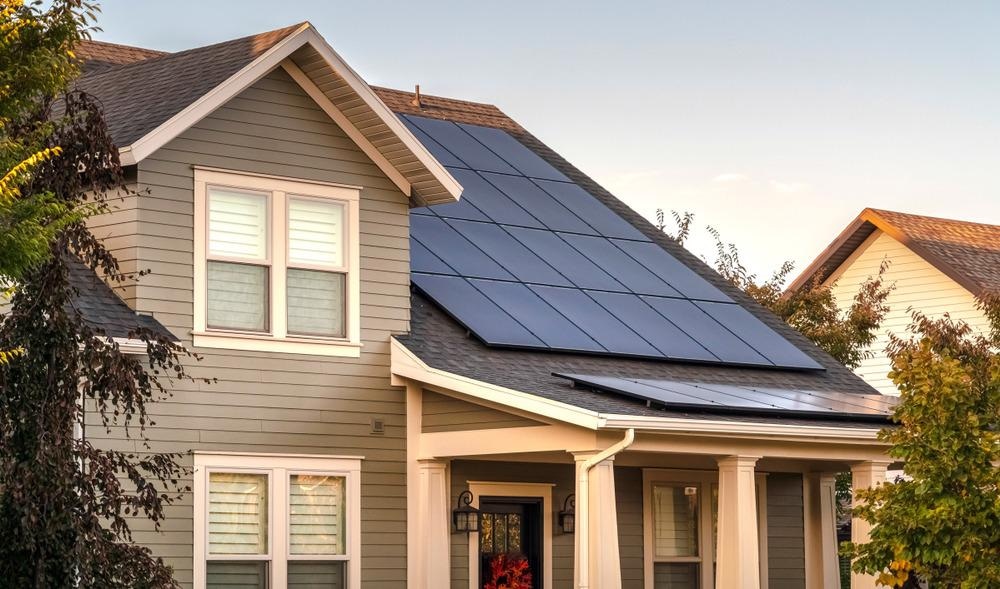
Image Credit: Jason Finn/Shutterstock.com
In many developed parts of the world, older residential buildings are energy inefficient, and so renovating them to make them more efficient is a major opportunity to reduce carbon emissions.
A German startup called ecoworks has taken this notion a step further and devised eco-friendly building solutions that include turning renovated houses into decentralized power plants.
During their overall life cycle, residential buildings currently represent around 40% of total energy use in Europe and 36% of greenhouse gas emissions. Much of this is attributed to out-of-date, inefficient buildings. In Germany, around 5 million housing units are situated multi-family properties that were constructed before 1978, and thus require modernization.
Established in 2019, ecoworks employs industrial pre-fabrication, digital techniques, and energy-efficient systems to convert multi-family homes with as many as four floors into energy-efficient buildings, all within a few weeks. Being a general contractor, ecoworks attends to the overall modernization project: submitting permit and funding applications, organizing workflows, and overseeing the project at the building site. After modernization has been completed, ecoworks acts as an energy supplier for the building for 15 years.
Modernizing Inefficient Buildings to Reduce Emissions
With an eye on energy efficiency, the startup modernizes the inefficient building envelope by refreshing the sides, roof, and windows. The process also includes insulation of the basement ceiling. The company uses prefab facade and roof components, in addition to pre-assembled building technology, to lower the overall workload by as much as 80%.
In the second phase, the residential building is transformed into a singular unit of decentralized power through the installation of solar panels, thermal reservoirs, and heat pumps. The ecoworks process was designed with affordability and short construction times in mind, with the goal of quickly making inefficient buildings climate-neutral and more attractive.
After being modernized, the efficient buildings are said to produce more power than occupants need for hot water, heating, and electricity. The surplus power can then be fed into the public grid, making these housing units decentralized power plants.
The German government's climate goals call for an efficiency restoration quota that is three times greater than the present one; a target that is extremely hard to attain with the current construction workforce. Because 95% of renovation and construction in Germany is performed by hand and on-site skilled construction workers are increasingly turning into a major bottleneck. According to some projections, there will be a gap of about 100,000 skilled construction workers in the coming decades.
To be able to answer this challenge, the ecoworks team developed digital planning techniques and prefabrication methods to achieve a net-zero modernization system. If the demand for net-zero modernization surges, ecoworks said investments would lead to long-term cost reductions, ideally reaching levels at which landlords can realize their expectations on returns, and residents are not overwhelmed with rising housing costs.
Residential buildings in Germany account for about 35% of final energy usage and 30% of the country's carbon dioxide emissions. To achieve the climate goal of preventing a 1.5-degree Celsius increase in average global temperatures, more inefficient buildings must be made carbon-neutral and construction operations must be completed with the lowest possible emissions. For its part, ecoworks has said it is still developing eco-friendly building solutions to lower modernization costs, so quickly lowering emissions from the housing sector is economically attainable.
The Debate Over Decentralized Solar
While the concept of a decentralized power plant may sound attractive to many people, there has been some significant pushback, particularly due to cost issues. Critics point out that solar panels on commercial and residential buildings cost up to four times as much per watt compared to large-scale solar installations.
Supporters say this oversimplified comparison and others like it overlook myriad benefits and avoided costs associated with decentralized power plants, which can be at or close to the point of need, rather than being hundreds of miles away. The potential benefit of a power grid with a significant decentralization component became obvious to citizens of Northern California in 2020 when Pacific Gas & Electric Company (PG&E) switched off power to approximately 750,000 residents in the battle against forest fires. Because power lines can spark wildfires, shutoffs address PG&E's massive liability for devastating California fires throughout the last few years.
While a more decentralized system would not completely get rid of shutoffs, they can reduce the need for them. In such a power system, distributed generation and associated microgrids would maintain critical loads.
The argument that rooftop solar panels and distributed power plants could reduce the need for power lines got a major boost in California's 2017-2018 transmission plan, which effectively canceled 20 new transmission jobs and modified 21 more as a result of high energy efficiency and household solar power changing load predictions, with a forecasted cost saving of $2.6 billion.
Resources and Further Reading
Tucker, C. ecoworks collects €5 million to make European buildings carbon neutral. EU-Startups. [Online] Available at: https://www.eu-startups.com/2020/04/ecoworks-collects-e5-million-to-make-european-buildings-carbon-neutral/
Roselund, C. Decentralization is more than a dream. pv magazine. [Online] Available at: https://pv-magazine-usa.com/2019/10/10/another-system-is-possible-could-a-decentralized-grid-avoid-power-shutoffs/
O’Neil, C. From the Bottom Up: Designing a Decentralized Power System. NREL. [Online] Available at: https://www.nrel.gov/news/features/2019/from-the-bottom-up-designing-a-decentralized-power-system.html
Disclaimer: The views expressed here are those of the author expressed in their private capacity and do not necessarily represent the views of AZoM.com Limited T/A AZoNetwork the owner and operator of this website. This disclaimer forms part of the Terms and conditions of use of this website.